Waitlist
Register Interest
You are now being directed to purchase your ticket on {{ form.agentname }}
Back to event page
 Back to all Festival Stories
Back to all Festival Stories
An essay by Crystal Butcher - A member of the Warumpi Band Family
09 Jan, 2024 Crystal Butcher
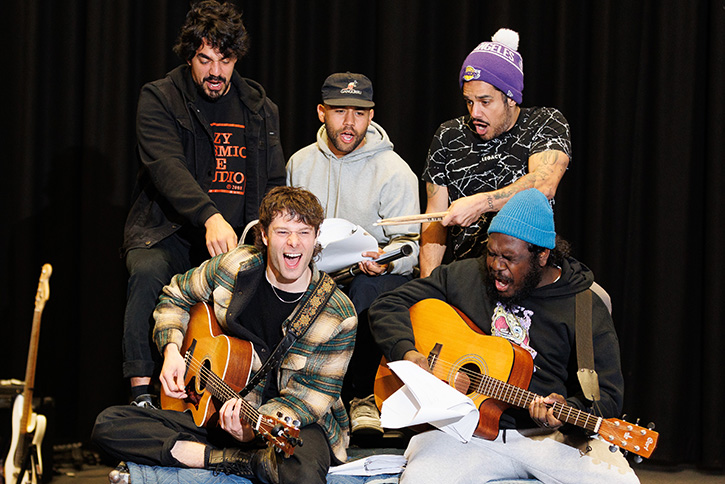
Warumpi Band left an enduring legacy on Australia's music scene across three decades, three albums, and three national ARIA awards. Their music had a profound impact on the national consciousness and resonated especially deeply in the central desert where their journey began. Warumpi Band’s electrifying rock anthems reverberated through Pintupi Luritja communities—Papunya, Mt Leibig, Haast Bluff, and Kintore—forming the sonic backdrop to desert childhoods. 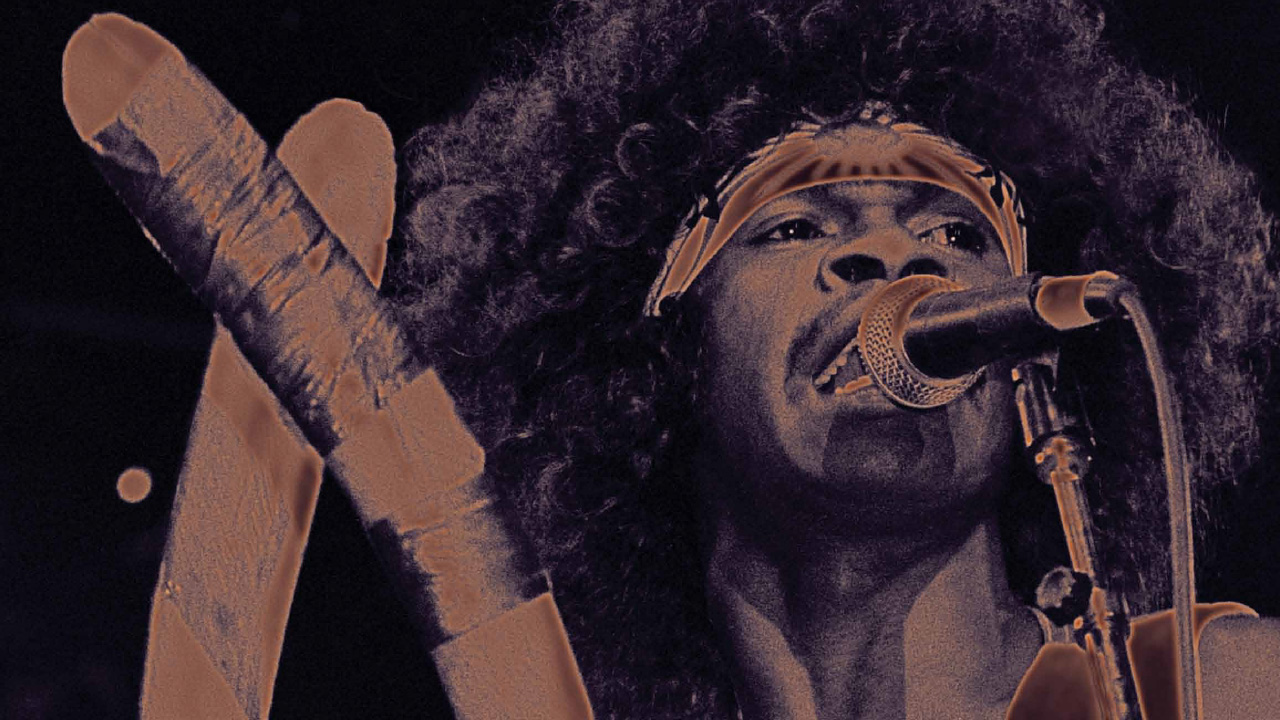 Above: Big Name No Blanket (2013)
Above: Big Name No Blanket (2013)
Growing up amidst the rise and peak of Warumpi Band's success set the stage for the next generation. Their radical, politically charged calls to action instilled hope and provided a voice for audiences that echoed the realities of their lives. The three critically acclaimed albums - "Big Name, No Blankets" (1985), "Go Bush!" (1987), and "Too Much Humbug" (1996) - not only defined an era but birthed a new sub-genre, Desert Reggae music. Desert Reggae, primarily sung in language, emerged as a potent storytelling tool, echoing Warumpi Band's ancient storytelling traditions.
At the core of this musical evolution stood Warumpi Band's lead guitarist, Sammy Butcher. His influence and Warumpi Band’s legacy provided a lifeline for youth grappling with profound challenges in the face of colonisation. Sammy's commitment to music as a positive outlet and a tool for empowerment is a beacon in the community and materialised in the setting up of a recording studio in Papunya in 2004. Warumpi Band's journey, encapsulated in their radical anthems, paved the way for a musical era that not only rocked stages but also resonated as a powerful force for societal change.
"Sammy Butcher's influence and Warumpi Band's legacy provided a lifetime for youth grappling with profound challenges in the face of colonisation."
– Crystal Butcher
Warumpi Band, was the first Aboriginal rock 'n' roll group to sing in language and incorporate traditional instruments such as didgeridoo, boomerang and clapping sticks. The band was formed in Papunya, 250 km West of Alice Springs in 1980. The original line-up consisted of George Rrurrambu Burarrwanga on vocals and didgeridoo, Gordon Butcher Tjapanangka on drums, Sammy Butcher Tjapanangka on lead guitar, Brian Butcher Tjapanangka on bass guitar and Neil Murray on rhythm guitar and backing vocals. Warumpi Band built up a loyal following in Sydney's northern beaches pub rock scene and played as a support act to Midnight Oil. In 1985 the band signed with Midnight Oil's Powderworks label and released their debut album, Big Name, No Blankets in April 1985. After three decades and numerous world and national tours, Warumpi Band brought their focus homeward to their family and their Community in the central desert. 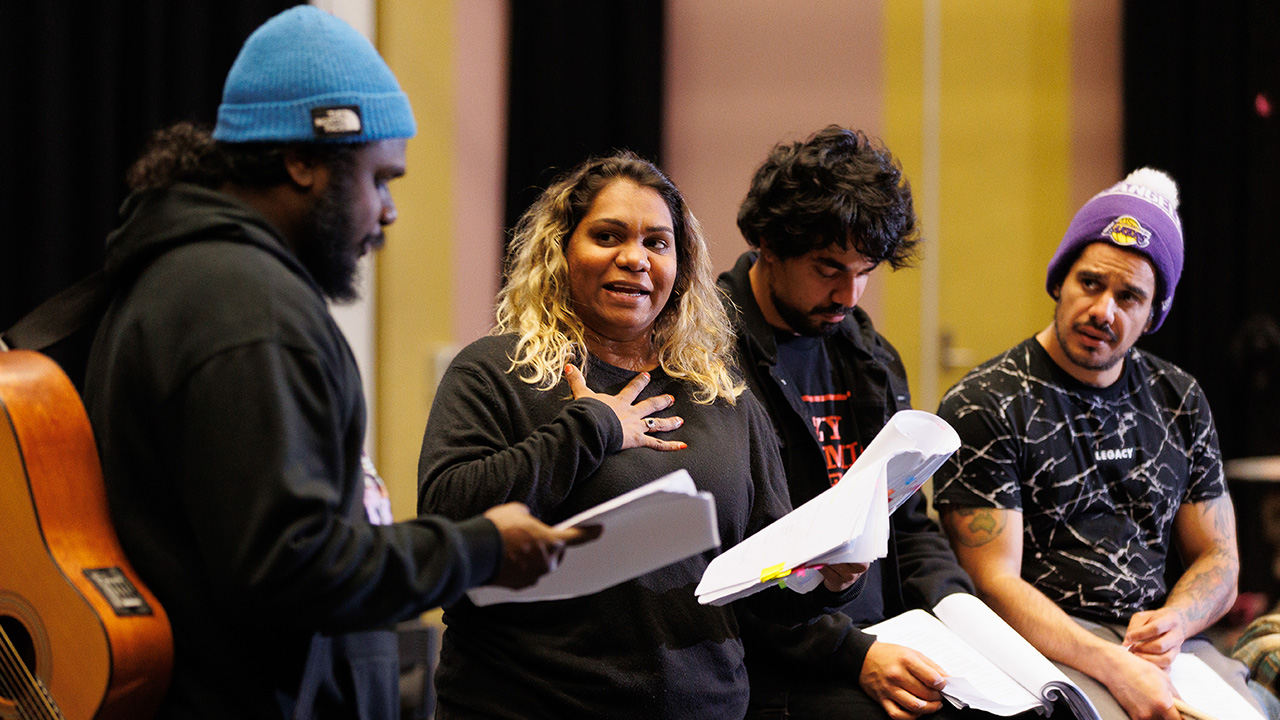 Above: Big Name, No Blankets rock 'n' roll theatre show rehearsals. Photo credit: James Henry
Above: Big Name, No Blankets rock 'n' roll theatre show rehearsals. Photo credit: James Henry
Whilst recognising that Warumpi Band's influence reached far and wide, the place they cultivated the strongest support was at home in the central desert. Right back to “Warumpinya” where it all began. Back to the dreaming site of the honey ant tjukurrpa. Right back, full circle.
In the early 2000’s young people in Papunya were dealing with the aftermath of assimilation, the ongoing effects of colonisation and the introduction of the NT Intervention. With a government that did not listen and increasing poverty, some young people turned to petrol sniffing as a means to cope with the intergenerational and ongoing colonial trauma. With rising suicide rates and a feeling of apathy and disempowerment, young people needed a positive outlet. Sammy's dedication, evident in the establishment of Papunya’s recording studio, played a pivotal role in reducing petrol sniffing by over 90% in Papunya. His core values centred around using music as a means of empowerment, bringing communities together, and sharing stories. The intergenerational commitment to lift up the next generation is shared in the documentary "Out of the Shadows" (2004). 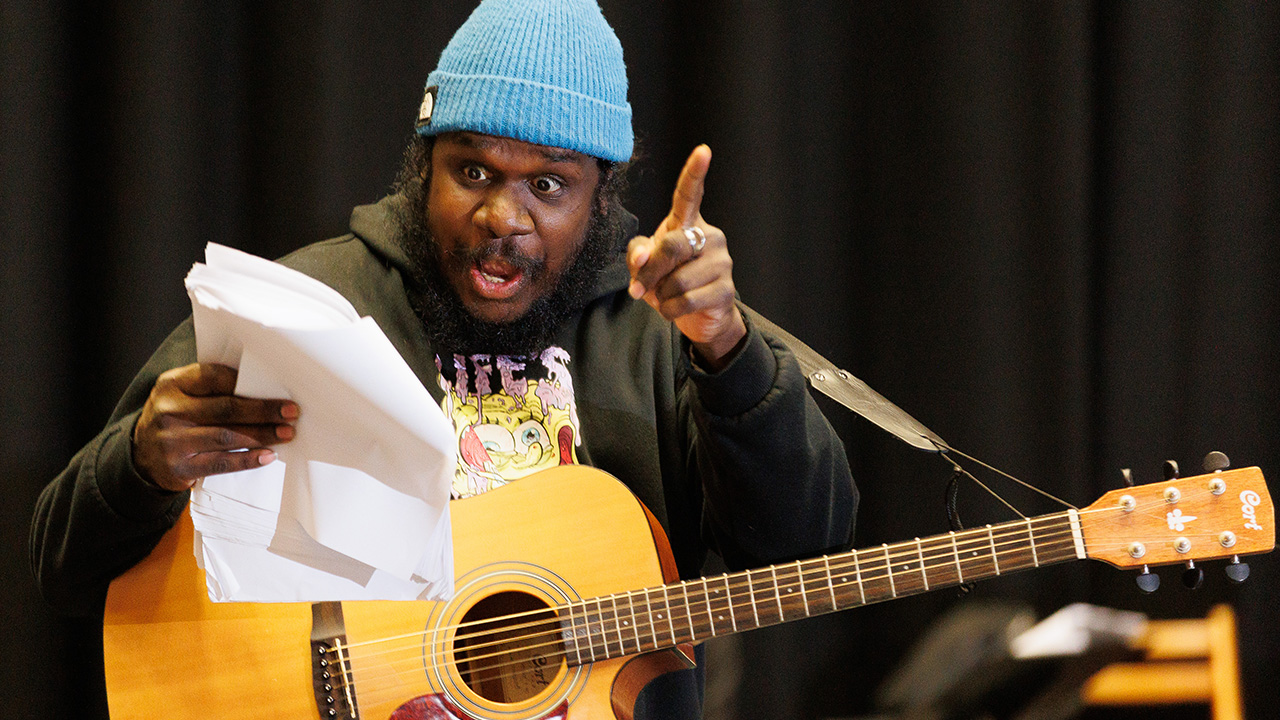 Above: Big Name, No Blankets rock 'n' roll theatre show rehearsals. Photo credit: James Henry.
Above: Big Name, No Blankets rock 'n' roll theatre show rehearsals. Photo credit: James Henry.
One of the first bands Sammy mentored was called “Little Orphan Band” which brought children from broken homes into the recording studio to immerse themselves in music and self-author their own sound and story. Sammy taught the youth to play instruments, to work together collaboratively in a band, and to record music. This gave rise to a new genre of music, Desert Reggae influenced by Warumpi Band’s sound as well as reggae, gospel and surf-inspired guitar riffs. Warumpi Band's influence seamlessly transitioned to the next generation of musicians in the Pintupi Luritja region, giving rise to this new genre that tackles social and political issues whilst singing in language and empowering their peers. This fusion genre is a testament to Sammy's guidance.
"Desert reggae now stands as the leading music genre across the Central Western Australian deserts."
– Crystal Butcher
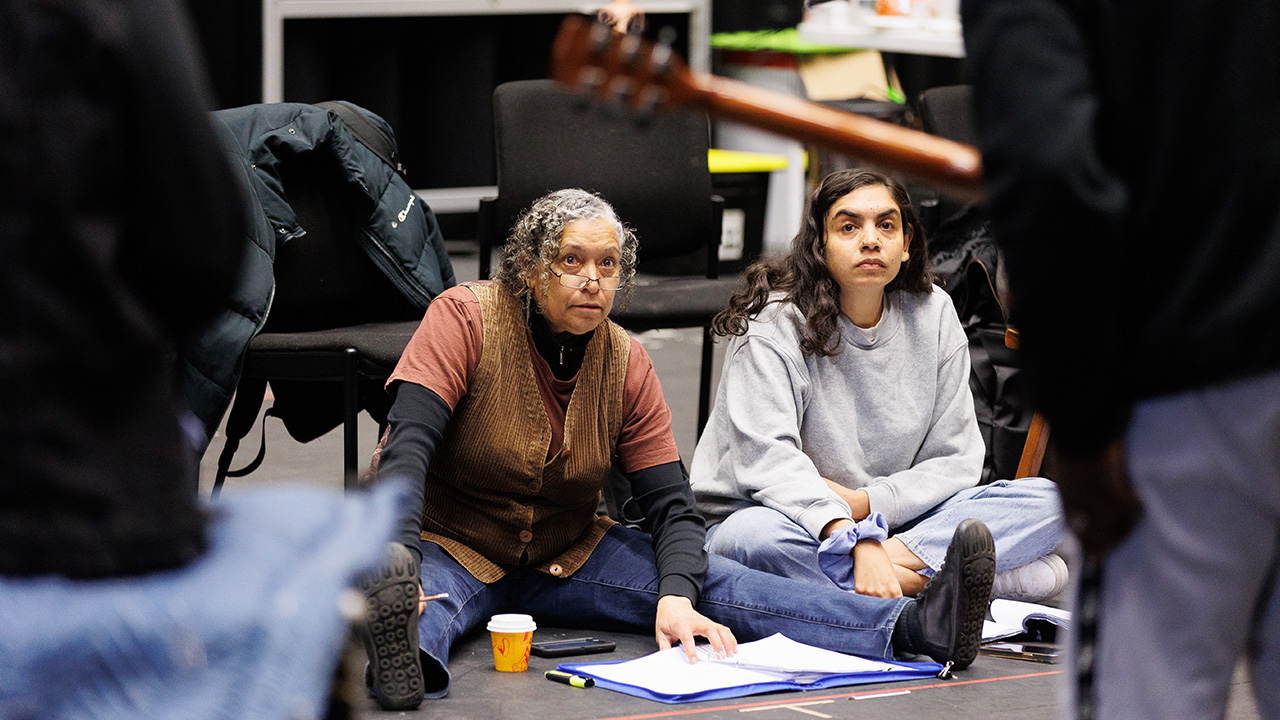 Above: Big Name, No Blankets rock 'n' theatre show rehearsals. Photo credit: James Henry.
Above: Big Name, No Blankets rock 'n' theatre show rehearsals. Photo credit: James Henry.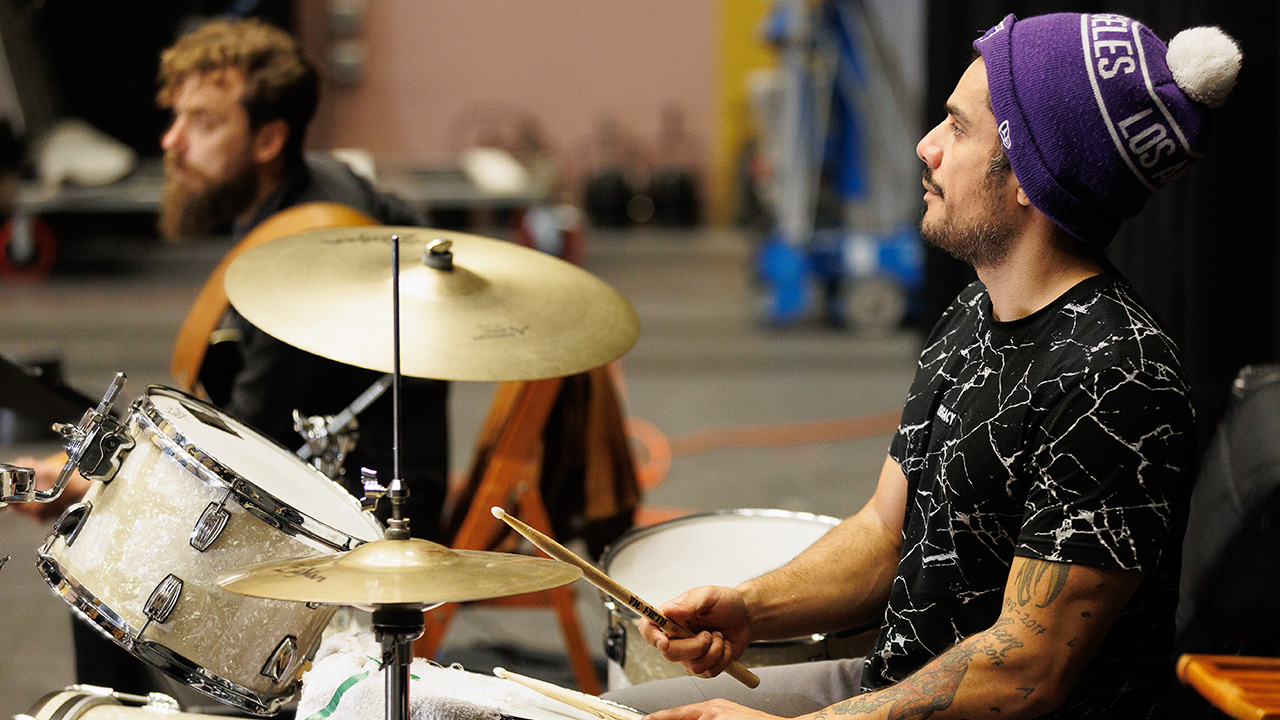 Above: Big Name, No Blankets rock 'n' roll theatre show rehearsals. Photo credit: James Henry.
Above: Big Name, No Blankets rock 'n' roll theatre show rehearsals. Photo credit: James Henry.
Read previous story
Read next story
